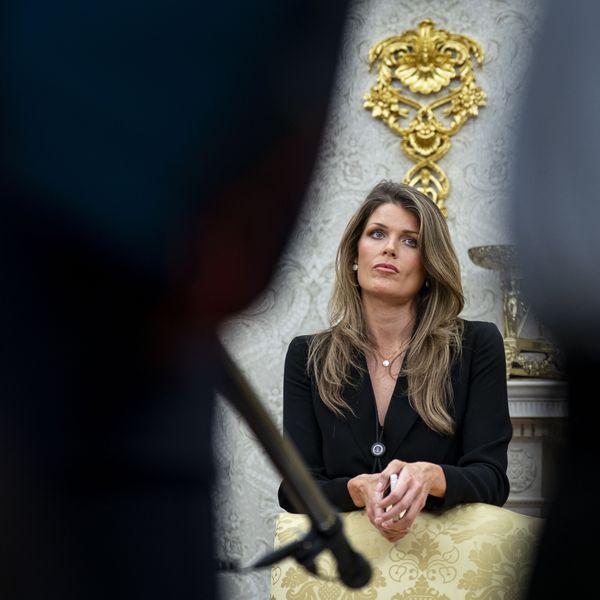A key reason that many Americans are turned off by politics is that they don't experience news sportscasters who are on their side. The average American, if she read the New York Times, would feel like a Chicagoan watching the Cubs game on St. Louis TV. Her team hits a home run and the sportscaster is melancholy. Her team strikes out and the sportscaster does a dance. Who wouldn't be turned off?
The day after the budget deal, we should have had a National Day of Gloating Over Wall Street because Social Security once again evaded the knives of the Wall Street greedheads. The day after the U.S. didn't bomb Syria, we should have had a National Day of Gloating Over AIPAC and the Neocons. But the U.S. news media was so sad! No Social Security cuts. No new war. What is America coming to?
Now the U.S. news media is so sad because Afghan President Hamid Karzai won't follow Washington's orders. You can't find good help these days! Washington has written an agreement for Karzai to sign that would enable U.S. troops to stay in the country after 2014. But Karzai says he won't sign unless the U.S. agrees to do two things: transfer Afghan prisoners from Gitmo to Afghanistan and start the peace talks with the Afghan Taliban to end the war.
According to the U.S. news media, the fact that Karzai is holding out risks disaster. What's the terrible thing that could happen if there's no agreement? All U.S. forces would have to withdraw from Afghanistan.
But from the point of view of most Americans, this would be no disaster. If all U.S. forces were withdrawn from Afghanistan, most Americans would be totally delighted.
Moreover, Karzai's demands are just demands that are quite consistent with stated U.S. policy. It's stated U.S. policy to close Gitmo, which means that the people who are held there have to be sent somewhere else. We should be delighted that Afghanistan wants to take its prisoners back. It's stated U.S. policy to try to start peace talks with the Afghan Taliban. Indeed, the Obama Administration tried to transfer Afghan Taliban prisoners from Gitmo to Qatar in order to start peace talks with the Afghan Taliban. What was the holdup? Congress, we were told. Republicans in Congress opposed the transfer of Afghan Taliban prisoners from Gitmo. Obama's hands were tied.
But Obama's hands were tied because he didn't try very hard to loosen them. The wimpiness of the Obama administration has been greatly exaggerated. When they really want something, they fight for it. Look what's happening now in Congress with the Iran nuclear deal. Republicans threatened to tank the negotiations by passing new sanctions on Iran. The administration fought back -- they actually got up off their butts, went down to Capitol Hill, and lobbied Congress -- and so far, there are no new Congressional sanctions.
The administration could do this on transferring the Afghan Taliban prisoners from Gitmo to start the peace talks. They could actually get up off their butts and go lobby Congress to permit the deal to go through. But they haven't, not because they couldn't, but because they don't care enough.
And this is why Karzai's negotiating strategy is totally rational. He has to make Washington care enough to implement its own stated policy.
From the point of view of the interests of the majority of Americans, it's win-win for Karzai to stand tall. If Washington calls his bluff, U.S. troops come home and we win. If Washington caves to Karzai's demands, the peace talks start and the war starts to wind down, which means that if U.S. troops stay, they are much less likely to be blown up, and if the peace holds, the U.S. troops will come home, because there will be no excuse for their presence and their departure is sure to be a condition of a final peace deal. So either way, Karzai's stand leads to U.S. troops not being blown up and coming home.
In particular, the fate of one U.S. soldier is directly tied to the prisoner transfer. Bowe Bergdahl comes home when the Afghan Taliban prisoners leave Gitmo.
And here's another reason that Karzai's stand is in our interest: Washington is trying to get a deal to keep U.S. troops in Afghanistan without getting Congressional approval. So the Administration's claim that it was urgent to get a deal by the end of the year served two purposes. The first purpose was to pressure Karzai to sign. The second purpose was to get a deal ahead of any Congressional vote. If you get the deal ahead of a Congressional vote, you can say to Congress, the deal is done. It's too late. If you vote no now, you're going to undermine the President, you're going to undermine U.S. foreign policy. But if the deal can be delayed until next summer -- which U.S. officials now admit is the case -- it's very likely that we can get a Congressional vote first, because the House typically considers the National Defense Authorization Act in the late Spring, and that's the perfect venue for an amendment against keeping U.S. troops in Afghanistan.
So if the U.S. news media represented the interests of the majority of Americans, here's what it would be saying: President Karzai, stand tall. Don't cave to Washington's pressure. Hold out for the prisoner transfer and the start of peace talks.
You can urge President Obama to transfer the prisoners and start the peace talks here.



